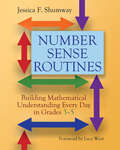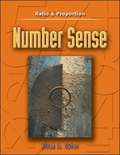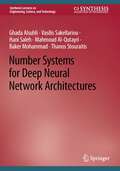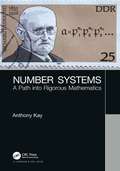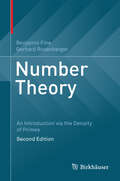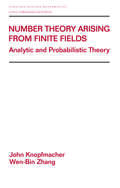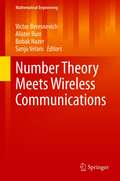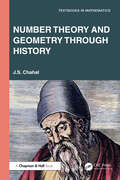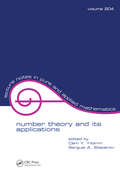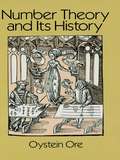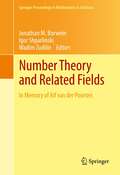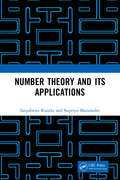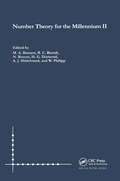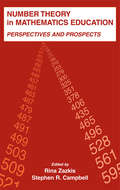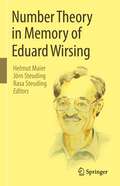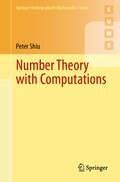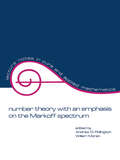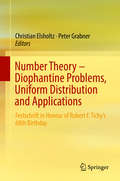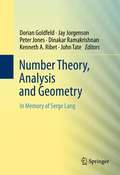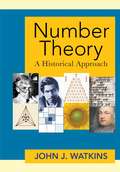- Table View
- List View
Number Savvy: From the Invention of Numbers to the Future of Data
by George SciadasThis book is written for the love of numbers. It tells their story, shows how they were invented and used to quantify our world, and explains what quantitative data mean for our lives. It aspires to contribute to overall numeracy through a tour de force presentation of the production, use, and evolution of data. Understanding our physical world, our economies, and our societies through quantification has been a persistent feature of human evolution. This book starts with a narrative on why and how our ancestors were driven to the invention of number, which is then traced to the eventual arrival at our number system. This is followed by a discussion of how numbers were used for counting, how they enabled the measurement of physical quantities, and how they led to the estimation of man-made and abstract notions in the socio-economic domain. As data don’t fall like manna from the sky, a unique feature of this book is that it explains from a teacher’s perspective how they’re really conceived in our minds, how they’re actually produced from individual observations, and how this defines their meaning and interpretation. It discusses the significance of standards, the use of taxonomies, and clarifies a series of misconceptions regarding the making of data. The book then describes the switch to a new research paradigm and its implications, highlights the arrival of microdata, illustrates analytical uses of data, and closes with a look at the future of data and our own role in it.
Number Sense Routines: Building Mathematical Understanding Every Day in Grades 3-5
by Jessica ShumwayFollowing up her' best-selling book, Number Sense Routines: Building Numerical Literacy Every Day in Grades K-3, Jessica Shumway turns her focus to upper elementary classrooms. Number Sense Routines: Developing Mathematical Understanding Every Day in Grades 3-5 is about tapping into every child' s innate number sense and providing daily, connected experiences that are responsive to children's learning needs. Consistent, Daily Routines Work:' Adaptable to any curriculum, Shumway' s 5, 10, or 15 minute warm-up routines are an easy and effective way to build and solidify students' number sense foundations as a supplement to any program Planning and Facilitating Your Classroom:' No matter how familiar the routine, Shumway provides insight on how to keep daily warm-ups fresh. She reveals careful thinking and planning that goes into each routine and offers detailed vignettes and dialogues of how they unfold in real classrooms Assessment Strategies:' As students engage in the process, each routine becomes an exciting opportunity to gain insight into where they are in their understanding and help students articulate their mathematical thinking Identify Big Ideas: Not only will these math routines help develop students' mathematical understanding as they move towards using standard algorithms, but teachers will learn to better recognize the big ideas that emerge in discussions, how to encourage important strategies based in number sense, and how to facilitate conversations on key mathematical concepts. ' 'These routines may appear in other places, [but] I have never seen them written in such detail and with so many variations.. . .. Although she makes what she does sound easy, we all know that teaching math well is anything but easy. It is challenging and complex. Unpacking what students are saying, helping them make connections not only to the math but to each other's ideas, while simultaneously recording their ideas using mathematical models, visuals, or equations is no easy task. Jessica provides wonderful visuals, examples of student work, and so much more to help educators develop the tools they need to improve their practice and in so doing improve student learning. ' ' ' ' ' ' ' ' ' ' ' ' ' ' ' ' ' ' ' ' ' ' ' ' ' ' ' ' ' ' ' ' ' ' ' ' ' ' ' ' ' ' ' ' ' ' ' ' ' ' ' ' ' ' ' ' ' ' ' ' ' ' ' ' ' ' ' ' ' ' ' ' ' ' ' ' ' ' ' ' ' ' ' ' ' ' ' ' ' ' ' ' ' ' ' ' ' ' ' ' ' ' ' ' ' ' ' ' ' ' ' ' ' ' ' ' ' ' ' ' ' – From the Foreword by math coach and consultant Lucy West
Number Sense and Nonsense: Building Math Creativity and Confidence Through Number Play
by Claudia ZaslavskyThese 80-plus math activities and number games help kids to think critically about math instead of just memorizing rules. The emphasis is on the underlying relationships between numbers and the process of manipulating them. Kids get together and play games with odd and even numbers, prime and composite numbers, factors, divisors, and multiples of numbers, common and decimal fractions. Children learn the history of numbers--finger counting, number symbols in various cultures, and different ways of calculating. The book is full of riddles, puzzles, number tricks, and calculator games. Kids develop skills in estimation and computation as they become familiar with the characteristics and behavior of numbers. They will gain math confidence and be ready to take chances, find their own errors, and challenge their peers.
Number Sense: Percent Applications
by Allan SuterContemporary's popular Number Sense mathematics series has been updated! Number Sense encourages students to explore number relationships to build a concrete understanding of mathematical operations, problem-solving strategies, and real-life applications. Each text uses a highly visual and active approach to introduce basic mathematics concepts. Each lesson is carefully designed to simultaneously build students' mastery and self-confidence. Each text illustrates a basic math skill with a step-by-step approach, and follows with lots of practice.
Number Systems for Deep Neural Network Architectures (Synthesis Lectures on Engineering, Science, and Technology)
by Baker Mohammad Hani Saleh Thanos Stouraitis Ghada Alsuhli Vasilis Sakellariou Mahmoud Al-QutayriThis book provides readers a comprehensive introduction to alternative number systems for more efficient representations of Deep Neural Network (DNN) data. Various number systems (conventional/unconventional) exploited for DNNs are discussed, including Floating Point (FP), Fixed Point (FXP), Logarithmic Number System (LNS), Residue Number System (RNS), Block Floating Point Number System (BFP), Dynamic Fixed-Point Number System (DFXP) and Posit Number System (PNS). The authors explore the impact of these number systems on the performance and hardware design of DNNs, highlighting the challenges associated with each number system and various solutions that are proposed for addressing them.
Number Systems: A Path into Rigorous Mathematics
by Anthony KayNumber Systems: A Path into Rigorous Mathematics aims to introduce number systems to an undergraduate audience in a way that emphasises the importance of rigour, and with a focus on providing detailed but accessible explanations of theorems and their proofs. The book continually seeks to build upon students' intuitive ideas of how numbers and arithmetic work, and to guide them towards the means to embed this natural understanding into a more structured framework of understanding. The author’s motivation for writing this book is that most previous texts, which have complete coverage of the subject, have not provided the level of explanation needed for first-year students. On the other hand, those that do give good explanations tend to focus broadly on Foundations or Analysis and provide incomplete coverage of Number Systems. Features Approachable for students who have not yet studied mathematics beyond school Does not merely present definitions, theorems and proofs, but also motivates them in terms of intuitive knowledge and discusses methods of proof Draws attention to connections with other areas of mathematics Plenty of exercises for students, both straightforward problems and more in-depth investigations Introduces many concepts that are required in more advanced topics in mathematics.
Number Talks, Grades K-5: Helping Children Build Mental Math and Computation Strategies
by Sherry ParrishNumber Talks A five- to fifteen-minute classroom conversation around purposefully crafted computation problems that are solved mentally. The best part of a teacher's day. This dynamic multimedia resource was created in response to the requests of teachers--those who want to implement number talks but are unsure of how to begin and those with experience who want more guidance in crafting purposeful problems. It supports teachers in understanding: what a classroom talk is; how to follow students' thinking and pose the right questions to build understanding; how to prepare for and design purposeful number talks; and how to develop grade-level-specific strategies for the operations of addition, subtraction, multiplication, and division. Number Talks supports the Common Core State Standards for Mathematics.
Number Talks: A Multimedia Professional Learning Resource
by Sherry Parrish Ann DominickNumber Talks 1. A five- to fifteen-minute classroom conversation around purposefully crafted problems that are solved mentally. 2. The best part of a teacher’s day. <p><p>This dynamic multimedia resource was created in response to the requests of teachers—those who want to implement number talks but are unsure of how to begin and those with experience who want more guidance in crafting purposeful problems. It supports teachers in understanding: <p><p>• what a classroom number talk is; <p><p>• how to follow students’ thinking and pose the right questions to build understanding; <p><p>• how to prepare for and design purposeful number talks; and <p><p>• how to develop fractional reasoning and strategies for operating with fractions, decimals, and percentages.
Number Theory
by Benjamin Fine Gerhard RosenbergerNumber theory is fascinating. Results about numbers often appear magical, both in theirstatementsandintheeleganceoftheirproofs. Nowhereisthismoreevidentthan inresultsaboutthesetofprimenumbers. Theprimenumbertheorem, whichgivesthe asymptotic density of the prime numbers, is often cited as the most surprising result in all of mathematics. It certainly is the result that is hardest to justify intuitively. The prime numbers form the cornerstone of the theory of numbers. Many, if not most, results in number theory proceed by considering the case of primes and then pasting the result together for all integers using the fundamental theorem of arithmetic. The purpose of this book is to give an introduction and overview of number theory based on the central theme of the sequence of primes. The richness of this somewhat unique approach becomes clear once one realizes how much number theoryandmathematicsingeneralareneededinordertolearnandtrulyunderstandthe prime numbers. Our approach provides a solid background in the standard material as well as presenting an overview of the whole discipline. All the essential topics are covered: fundamental theorem of arithmetic, theory of congruences, quadratic reciprocity, arithmetic functions, the distribution of primes. In addition, there are ?rm introductions to analytic number theory, primality testing and cryptography, and algebraic number theory as well as many interesting side topics. Full treatments and proofs are given to both Dirichlet s theorem and the prime number theorem. There is acompleteexplanationofthenewAKSalgorithm, whichshowsthatprimalitytesting is of polynomial time. In algebraic number theory there is a complete presentation of primes and prime factorizations in algebraic number ?elds. "
Number Theory Arising From Finite Fields: Analytic And Probabilistic Theory
by John Knopfmacher Wen-Bin Zhang"Number Theory Arising from Finite Fields: Analytic and Probabilistic Theory" offers a discussion of the advances and developments in the field of number theory arising from finite fields. It emphasizes mean-value theorems of multiplicative functions, the theory of additive formulations, and the normal distribution of values from additive functions
Number Theory Meets Wireless Communications (Mathematical Engineering)
by Alister Burr Victor Beresnevich Bobak Nazer Sanju VelaniThis volume explores the rich interplay between number theory and wireless communications, reviewing the surprisingly deep connections between these fields and presenting new research directions to inspire future research. The contributions of this volume stem from the Workshop on Interactions between Number Theory and Wireless Communication held at the University of York in 2016. The chapters, written by leading experts in their respective fields, provide direct overviews of highly exciting current research developments. The topics discussed include metric Diophantine approximation, geometry of numbers, homogeneous dynamics, algebraic lattices and codes, network and channel coding, and interference alignment. The book is edited by experts working in number theory and communication theory. It thus provides unique insight into key concepts, cutting-edge results, and modern techniques that play an essential role in contemporary research. Great effort has been made to present the material in a manner that is accessible to new researchers, including PhD students. The book will also be essential reading for established researchers working in number theory or wireless communications looking to broaden their outlook and contribute to this emerging interdisciplinary area.
Number Theory and Geometry through History (Textbooks in Mathematics)
by J. S. ChahalThis is a unique book that teaches mathematics and its history simultaneously. Developed from a course on the history of mathematics, this book is aimed at mathematics teachers who need to learn more about mathematics than its history, and in a way they can communicate it to middle and high school students. The author hopes to overcome, through the teachers using this book, math phobia among these students.Number Theory and Geometry through History develops an appreciation of mathematics by not only looking at the work of individual, including Euclid, Euler, Gauss, and more, but also how mathematics developed from ancient civilizations. Brahmins (Hindu priests) devised our current decimal number system now adopted throughout the world. The concept of limit, which is what calculus is all about, was not alien to ancient civilizations as Archimedes used a method similar to the Riemann sums to compute the surface area and volume of the sphere.No theorem here is cited in a proof that has not been proved earlier in the book. There are some exceptions when it comes to the frontier of current research.Appreciating mathematics requires more than thoughtlessly reciting first the ten by ten, then twenty by twenty multiplication tables. Many find this approach fails to develop an appreciation for the subject. The author was once one of those students. Here he exposes how he found joy in studying mathematics, and how he developed a lifelong interest in it he hopes to share.The book is suitable for high school teachers as a textbook for undergraduate students and their instructors. It is a fun text for advanced readership interested in mathematics.
Number Theory and Its Applications
by Cem Y. Yıldırım Serguei A. StepanovThis valuable reference addresses the methods leading to contemporary developments in number theory and coding theory, originally presented as lectures at a summer school held at Bilkent University, Ankara, Turkey.
Number Theory and Its History
by Oystein OreUnusually clear, accessible introduction covers counting, properties of numbers, prime numbers, Aliquot parts, Diophantine problems, congruences, much more. Bibliography.
Number Theory and Related Fields
by Igor Shparlinski Wadim Zudilin Jonathan M. Borwein"Number Theory and Related Fields" collects contributions based on the proceedings of the "International Number Theory Conference in Memory of Alf van der Poorten," hosted by CARMA and held March 12-16th 2012 at the University of Newcastle, Australia. The purpose of the conference was to promote number theory research in Australia while commemorating the legacy of Alf van der Poorten, who had written over 170 papers on the topic of number theory and collaborated with dozens of researchers. The research articles and surveys presented in this book were written by some of the most distinguished mathematicians in the field of number theory, and articles will include related topics that focus on the various research interests of Dr. van der Poorten.
Number Theory and its Applications
by Satyabrota Kundu Supriyo MazumderNumber Theory and its Applications is a textbook for students pursuing mathematics as major in undergraduate and postgraduate courses. Please note: Taylor & Francis does not sell or distribute the print book in India, Pakistan, Nepal, Bhutan, Bangladesh and Sri Lanka.
Number Theory for the Millennium II
by M. A. Bennett N. Boston H. G. Diamond A. J. Hildebrand B. C. Berndt W PhilippBuilding on the tradition of an outstanding series of conferences at the University of Illinois at Urbana-Champaign, the organizers attracted an international group of scholars to open the new Millennium with a conference that reviewed the current state of number theory research and pointed to future directions in the field. The conference was the largest general number theory conference in recent history, featuring a total of 159 talks, with the plenary lectures given by George Andrews, Jean Bourgain, Kevin Ford, Ron Graham, Andrew Granville, Roger Heath-Brown, Christopher Hooley, Winnie Li, Kumar Murty, Mel Nathanson, Ken Ono, Carl Pomerance, Bjorn Poonen, Wolfgang Schmidt, Chris Skinner, K. Soundararajan, Robert Tijdeman, Robert Vaughan, and Hugh Williams. The Proceedings Volumes of the conference review some of the major number theory achievements of this century and to chart some of the directions in which the subject will be heading during the new century. These volumes will serve as a useful reference to researchers in the area and an introduction to topics of current interest in number theory for a general audience in mathematics.
Number Theory in Mathematics Education: Perspectives and Prospects (Studies in Mathematical Thinking and Learning Series)
by Rina Zazkis Stephen R. CampbellThis book offers multiple interconnected perspectives on the largely untapped potential of elementary number theory for mathematics education: its formal and cognitive nature, its relation to arithmetic and algebra, its accessibility, its utility and intrinsic merits, to name just a few. Its purpose is to promote explication and critical dialogue about these issues within the international mathematics education community. The studies comprise a variety of pedagogical and research orientations by an international group of researchers that, collectively, make a compelling case for the relevance and importance of number theory in mathematics education in both pre K-16 settings and mathematics teacher education.Topics variously engaged include:*understanding particular concepts related to numerical structure and number theory;*elaborating on the historical and psychological relevance of number theory in concept development;*attaining a smooth transition and extension from pattern recognition to formative principles;*appreciating the aesthetics of number structure;*exploring its suitability in terms of making connections leading to aha! insights and reaching toward the learner's affective domain;*reexamining previously constructed knowledge from a novel angle;*investigating connections between technique and theory;*utilizing computers and calculators as pedagogical tools; and*generally illuminating the role number theory concepts could play in developing mathematical knowledge and reasoning in students and teachers.Overall, the chapters of this book highlight number theory-related topics as a stepping-stone from arithmetic toward generalization and algebraic formalism, and as a means for providing intuitively grounded meanings of numbers, variables, functions, and proofs.Number Theory in Mathematics Education: Perspectives and Prospects is of interest to researchers, teacher educators, and students in the field of mathematics education, and is well suited as a text for upper-level mathematics education courses.
Number Theory in Memory of Eduard Wirsing
by Helmut Maier Jörn Steuding Rasa SteudingEduard Wirsing was an outstanding number theorist. In his research he made significant contributions to various subfields of number theory and also collaborated with other eminent scientists (e.g., with the Fields Medalist Alan Baker as well as Don Zagier). This commemorative volume includes numerous papers on current research in number theory by well-known experts, as well as some personal recollections by companions of Wirsing. The topics covered in this volume include arithmetical functions, continued fractions, elementary proofs of the prime number theorem, friable integers, the Goldbach problem, Dirichlet series, Euler products, and more. There is something for every interested reader.
Number Theory with Computations (Springer Undergraduate Mathematics Series)
by Peter ShiuThis introductory text is designed for undergraduate courses in number theory, covering both elementary number theory and analytic number theory. The book emphasises computational aspects, including algorithms and their implementation in Python. The book is divided into two parts. The first part, on elementary number theory, deals with concepts such as induction, divisibility, congruences, primitive roots, cryptography, and continued fractions. The second part is devoted to analytic number theory and includes chapters on Dirichlet’s theorem on primes in arithmetic progressions, the prime number theorem, smooth numbers, and the famous circle method of Hardy and Littlewood. The book contains many topics not often found in introductory textbooks, such as Aubry’s theorem, the Tonelli–Shanks algorithm, factorisation methods, continued fraction representations of e, and the irrationality of 𝜁(3). Each chapter concludes with a summary and notes, as well as numerous exercises. Assuming only basic calculus for the first part of the book, the second part assumes some knowledge of complex analysis. Familiarity with basic coding syntax will be helpful for the computational exercises.
Number Theory with an Emphasis on the Markoff Spectrum (Lecture Notes In Pure And Applied Mathematics Ser. #147)
by William Moran Andrew D. PollingtonPresenting the proceedings of a recently held conference in Provo, Utah, this reference provides original research articles in several different areas of number theory, highlighting the Markoff spectrum.;Detailing the integration of geometric, algebraic, analytic and arithmetic ideas, Number Theory with an Emphasis on the Markoff Spectrum contains refereed contributions on: general problems of diophantine approximation; quadratic forms and their connections with automorphic forms; the modular group and its subgroups; continued fractions; hyperbolic geometry; and the lower part of the Markoff spectrum.;Written by over 30 authorities in the field, this book should be a useful resource for research mathematicians in harmonic analysis, number theory algebra, geometry and probability and graduate students in these disciplines.
Number Theory – Diophantine Problems, Uniform Distribution and Applications
by Christian Elsholtz Peter GrabnerThis volume is dedicated to Robert F. Tichy on the occasion of his 60th birthday. Presenting 22 research and survey papers written by leading experts in their respective fields, it focuses on areas that align with Tichy's research interests and which he significantly shaped, including Diophantine problems, asymptotic counting, uniform distribution and discrepancy of sequences (in theory and application), dynamical systems, prime numbers, and actuarial mathematics. Offering valuable insights into recent developments in these areas, the book will be of interest to researchers and graduate students engaged in number theory and its applications.
Number Theory, Analysis and Geometry
by Jay Jorgenson Dorian Goldfeld Dinakar Ramakrishnan John Tate Peter Jones Kenneth RibetSerge Lang was an iconic figure in mathematics, both for his own important work and for the indelible impact he left on the field of mathematics, on his students, and on his colleagues. Over the course of his career, Lang traversed a tremendous amount of mathematical ground. As he moved from subject to subject, he found analogies that led to important questions in such areas as number theory, arithmetic geometry, and the theory of negatively curved spaces. Lang's conjectures will keep many mathematicians occupied far into the future. In the spirit of Lang's vast contribution to mathematics, this memorial volume contains articles by prominent mathematicians in a variety of areas of the field, namely Number Theory, Analysis, and Geometry, representing Lang's own breadth of interest and impact. A special introduction by John Tate includes a brief and fascinating account of the Serge Lang's life. This volume's group of 6 editors are also highly prominent mathematicians and were close to Serge Lang, both academically and personally. The volume is suitable to research mathematicians in the areas of Number Theory, Analysis, and Geometry.
Number Theory, Fourier Analysis and Geometric Discrepancy
by Giancarlo TravagliniThe study of geometric discrepancy, which provides a framework for quantifying the quality of a distribution of a finite set of points, has experienced significant growth in recent decades. This book provides a self-contained course in number theory, Fourier analysis and geometric discrepancy theory, and the relations between them, at the advanced undergraduate or beginning graduate level. It starts as a traditional course in elementary number theory, and introduces the reader to subsequent material on uniform distribution of infinite sequences, and discrepancy of finite sequences. Both modern and classical aspects of the theory are discussed, such as Weyl's criterion, Benford's law, the Koksma–Hlawka inequality, lattice point problems, and irregularities of distribution for convex bodies. Fourier analysis also features prominently, for which the theory is developed in parallel, including topics such as convergence of Fourier series, one-sided trigonometric approximation, the Poisson summation formula, exponential sums, decay of Fourier transforms, and Bessel functions.
Number Theory: A Historical Approach
by John J. Watkins<p>The natural numbers have been studied for thousands of years, yet most undergraduate textbooks present number theory as a long list of theorems with little mention of how these results were discovered or why they are important. This book emphasizes the historical development of number theory, describing methods, theorems, and proofs in the contexts in which they originated, and providing an accessible introduction to one of the most fascinating subjects in mathematics. <p>Written in an informal style by an award-winning teacher, Number Theory covers prime numbers, Fibonacci numbers, and a host of other essential topics in number theory, while also telling the stories of the great mathematicians behind these developments, including Euclid, Carl Friedrich Gauss, and Sophie Germain. This one-of-a-kind introductory textbook features an extensive set of problems that enable students to actively reinforce and extend their understanding of the material, as well as fully worked solutions for many of these problems. It also includes helpful hints for when students are unsure of how to get started on a given problem. <p> <li>Uses a unique historical approach to teaching number theory <li>Features numerous problems, helpful hints, and fully worked solutions <li>Discusses fun topics like Pythagorean tuning in music, Sudoku puzzles, and arithmetic progressions of primes <li>Includes an introduction to Sage, an easy-to-learn yet powerful open-source mathematics software package <li>Ideal for undergraduate mathematics majors as well as non-math majors <li>Digital solutions manual (available only to professors)</li> </p>

